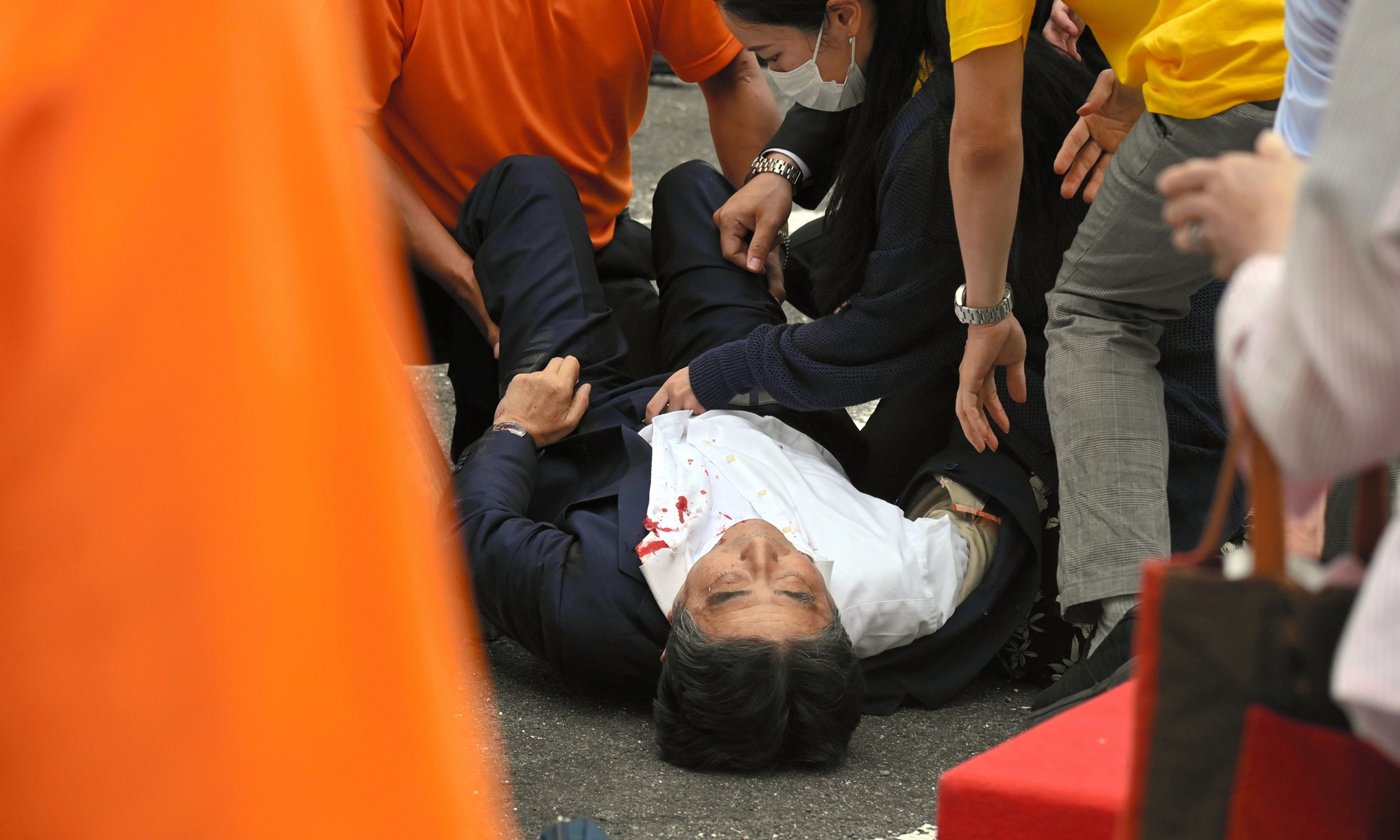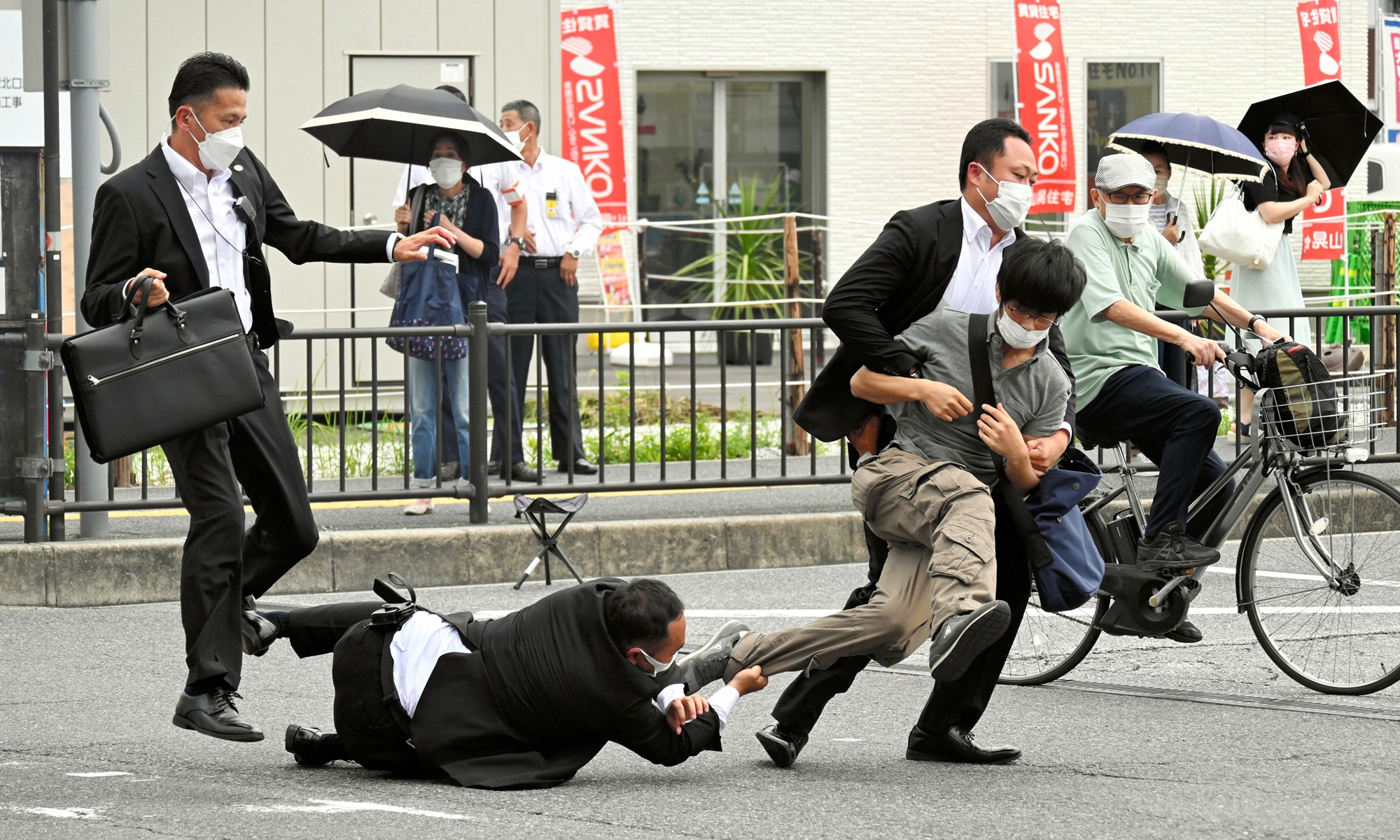Abe remembered in China as controversial figure who 'ruined own contribution to bilateral ties'

Former Japanese prime minister Shinzo Abe lies bleeding on the ground after being shot on July 8, 2022, in Nara during a street campaign speech. Photo: VCG
Former Japanese prime minister Shinzo Abe, 67, died hours after being shot by a gunman on Friday, July 8, in western Japan's Nara, where he was making a campaign speech for the parliament's upper house election to be held on Sunday.
Chinese observers described the assassination of Abe as the biggest political incident in Japanese politics since the end of World War II and warned about ripple effects from the death of this controversial figure, who once contributed to China-Japan relations but later tore those achievements apart.
A doctor with the Nara Medical University Hospital said at a press conference that Abe died at 5:03 pm, Kyodo News reported.
The attacker has been arrested and the case is under investigation. According to Japanese media reports, the suspect is a 41-year-old man and the motive for the attack remains unclear.
Chinese Foreign Ministry spokesperson Zhao Lijian, commenting on the attack of Abe and his death, said China was shocked by the attack. Abe once made contributions to improving Japan's ties with China and we extend condolences to his family, Zhao said.
Chinese embassy in Japan also expressed sympathy over Abe's death.
While for the Chinese public, Abe was a controversial political figure - he had improved Japan's relations with China, which is marked by two icebreaking trips during his second term in 2013 and 2018, yet his remarks and actions, including frequent visits to the notorious Yasukuni Shrine and denial of Japan's invasion history, led to his bad reputation among Chinese public.
The first icebreaking visit was made after Japan's ludicrous territorial claim over the Diaoyu Islands which dragged bilateral relations to abyss. His second icebreaking visit to China was in October 2018, when he attended events marking the 40th anniversary of the signing of the China-Japan Treaty of Peace and Friendship and a forum promoting infrastructure cooperation between companies of the two countries. In 2017, Abe publicly expressed willingness to cooperate with China on the Belt and Road Initiative and said he would not rule out joining the China-headquartered Asian Infrastructure Investment Bank.
However, on December 2021, Abe, who had already left the post of prime minister, falsely claimed that "a Taiwan emergency is a Japanese emergency," a serious violation and provocation against the one-China principle, not to mention his frequent visits and tributes to the Yasukuni Shrine.
Those wrong words and deeds after Abe stepped down almost completely overturned the achievements he once made in underpinning China-Japan ties.
Lü Chao, director of the Institute of the US and East Asian Studies at Liaoning University, described Abe as an "actor."
Abe, when in office, had to consider ties with China, particularly the economic facet, because that will bring benefits to Japan. No matter what purpose he had, the contributions he made to China-Japan ties were remembered.
But Lü pointed out that Abe did not recognize Japan's war crimes. That's why Abe spoke his mind after stepping down and acted unscrupulously over the Taiwan question.
On top of his contributions and wrongdoings, analysts believe that Abe was one of the most irreplaceable figures in Japanese politics this century.
As a two-time prime minister and leader of the largest faction in Japan's ruling Liberal Democratic Party (LDP), Abe's death could ripple through Japanese politics and the international community, experts said. The Japanese right-wing forces may use this incident to push forward the trend of conservative transformation in Japanese politics, and Abe's supporters will continue to promote "free and open Indo-Pacific" and his other policies, bringing more security risks to Northeast Asia, according to analysts.

Security personnel tackle and arrest a suspect believed to have shot former prime minister Shinzo Abe on July 8, 2022 in Nara, Japan. Photo: VCG
Not just by accident
Xiang Haoyu, a research fellow at the China Institute of International Studies, told the Global Times on Friday that given that the shooting comes at a sensitive time ahead of the upper house election, political motives could not be ruled out.
Although Abe has been the longest-serving prime minister in Japan, there are mixed opinions on Abe in Japan, and anti-Abe public opinions have always existed, including dissatisfaction with the widening gap between the rich and the poor caused by Abenomics, and disgust with his forced adjustment of military and security policies, Xiang said.
Liu Jiangyong, vice dean of the Institute of Modern International Relations at Tsinghua University, told the Global Times on Friday that Japan is facing multiple problems such as the depreciation of the yen, inflation, unemployment and the rebound of the epidemic, which all require the Japanese government to take effective measures. Instead of responding to people's anxiety and dissatisfaction, Japanese politicians are constantly hyping threats of neighboring countries, deflecting the attention of the public and stressing the need to strengthen the military.
As the leader of Japan's largest political faction, Abe has long wielded a lot of influence in the country's domestic and foreign affairs, Liu said, noting that Japan's opposition is too loose to balance the LDP's policies.
Therefore, it cannot be ruled out that the criminal suspect was strongly dissatisfied with the policies of the Japanese government under the "de facto control of Abe," as there's no way to change the status quo, so he picked an extreme way, Liu said.
Stimulation to the right wing
Although the attacker's political leanings have yet to be officially confirmed, Chinese experts said it is almost certain that Abe's death will not stop the conservative trend in Japanese politics as a whole, but may strengthen it to some extent.
Abe has served as Japanese prime minister twice, from 2006 to 2007 and from late 2012 to 2020, making him the longest-serving prime minister under Japan's modern cabinet system. After stepping down for health reasons, Abe has continued to play a major role in Japanese politics as a member of the House of Representatives.
"Abe's visit to Nara is to promote the LDP's constitutional revision program," said Lü Yaodong, a research fellow with the Institute of Japanese Studies under the Chinese Academy of Social Sciences. He added that Abe's future successor could accelerate the revision of pacifist constitution process under the banner of "inheriting Abe's legacy."
The attack on Abe will certainly provoke the extreme Japanese right wing, Lü said.
Da Zhigang, director of the Institute of Northeast Asian Studies at Heilongjiang Provincial Academy of Social Sciences, told the Global Times on Friday that ahead of upper-house elections, Abe's death could serve as a "symbol" for the LDP conservative forces to gain more sympathy from Japanese public.
At the moment, Japan does not seem to have the potential to radically change the country's trajectory or the regional dynamics, but Abe's death could stimulate the extreme Japanese right wing to promote populist, xenophobic and even extreme political goals, Lu Hao, a research fellow at the Institute of Japanese Studies at the Chinese Academy of Social Sciences, told the Global Times on Friday.
Similar to Japan's domestic politics, Abe's successors and supporters are expected to continue to promote Abe's external policy in Indo-Pacific and active participation in the QUAD mechanism, and accelerate the pace of NATO's entry in Asia, bringing more risks to the Northeast Asia, Lü said.
